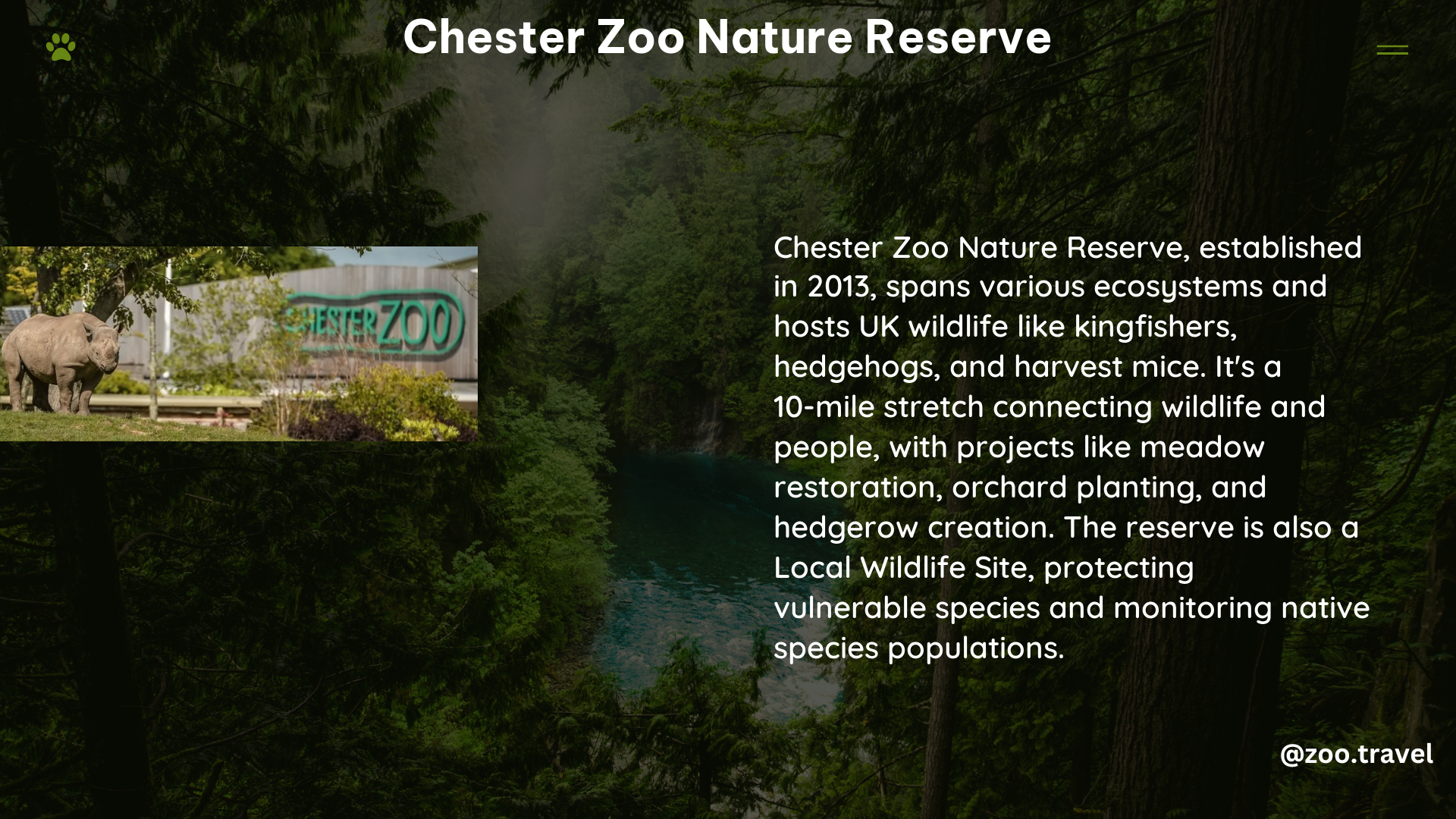Chester Zoo Nature Reserve is a unique and vital part of the Chester Zoo, dedicated to the conservation and protection of native UK wildlife. Established in 2013, the nature reserve covers an area of over 40 acres, providing a safe haven for a diverse array of species, including kingfishers, hedgehogs, harvest mice, and even otters.
Exploring the Chester Zoo Nature Reserve
The Chester Zoo Nature Reserve is a free-to-visit destination, offering visitors the opportunity to immerse themselves in the natural wonders of the UK. Visitors are encouraged to explore the reserve, observe the wildlife, and participate in conservation efforts by recording their sightings and creating wildlife-friendly spaces in their own gardens.
Connecting with Nature
The nature reserve is part of a larger conservation project, the Chester Zoo Nature Recovery Corridor, which aims to connect wildlife with wildlife, wildlife with people, and people with people across a 10-mile stretch of land connecting Chester and Ellesmere Port. This project involves the creation, improvement, and management of five unique habitats: hedgerows, orchards, ponds, meadows/grasslands, and woodlands.
Wildlife Connections Trail
In addition to the nature reserve, Chester Zoo offers a Wildlife Connections Trail, which connects the nature reserve to the City Forest Garden and passes through unique and diverse wildlife-friendly spaces. This trail is designed to connect people with nature and promote the benefits of green spaces for wildlife, the environment, infrastructure, health, and wellbeing.
Conservation Efforts at Chester Zoo

Chester Zoo is committed to conservation efforts around the globe, with teams working in six regions representing some of the planet’s most biodiverse habitats. The zoo also supports a number of UK-based conservation projects to help native species flourish and better understand the threats they face.
Local Wildlife Site
The Chester Zoo Nature Reserve is a designated Local Wildlife Site, which means it is recognized for its importance in supporting a wide range of plants, birds, and invertebrates. This designation highlights the reserve’s role in preserving and enhancing the local biodiversity.
Habitat Management
The management of the nature reserve’s habitats is crucial to the success of its conservation efforts. The zoo’s team of experts works tirelessly to maintain and improve the hedgerows, orchards, ponds, meadows/grasslands, and woodlands, ensuring that they provide the best possible environment for the resident wildlife.
Wildlife Monitoring
Visitors to the Chester Zoo Nature Reserve are encouraged to participate in wildlife monitoring by recording their sightings. This data is invaluable for the zoo’s conservation efforts, as it helps to track the populations and movements of the various species that call the reserve home.
Visiting the Chester Zoo Nature Reserve
The Chester Zoo Nature Reserve is free to visit, but visitors are reminded to be mindful of others and follow social distancing guidelines. Unfortunately, dogs are not allowed due to the presence of precious and endangered wildlife.
Accessibility
The nature reserve is accessible to visitors of all abilities, with a network of well-maintained paths and trails. Visitors can explore the reserve at their own pace, taking in the sights and sounds of the UK’s native wildlife.
Facilities
While the nature reserve itself does not have any dedicated facilities, visitors can access the amenities available at the main Chester Zoo site, including restaurants, shops, and restrooms.
Conclusion
The Chester Zoo Nature Reserve is a true gem for zoo touring enthusiasts, offering a unique opportunity to connect with the UK’s native wildlife and support important conservation efforts. Whether you’re a nature enthusiast, a wildlife photographer, or simply someone who appreciates the beauty of the great outdoors, the Chester Zoo Nature Reserve is a must-visit destination.
References:
– Chester Zoo Nature Reserve
– Chester Zoo Nature Recovery Corridor
– Wildlife Connections Trail
– Chester Zoo Conservation Efforts
– Local Wildlife Site
